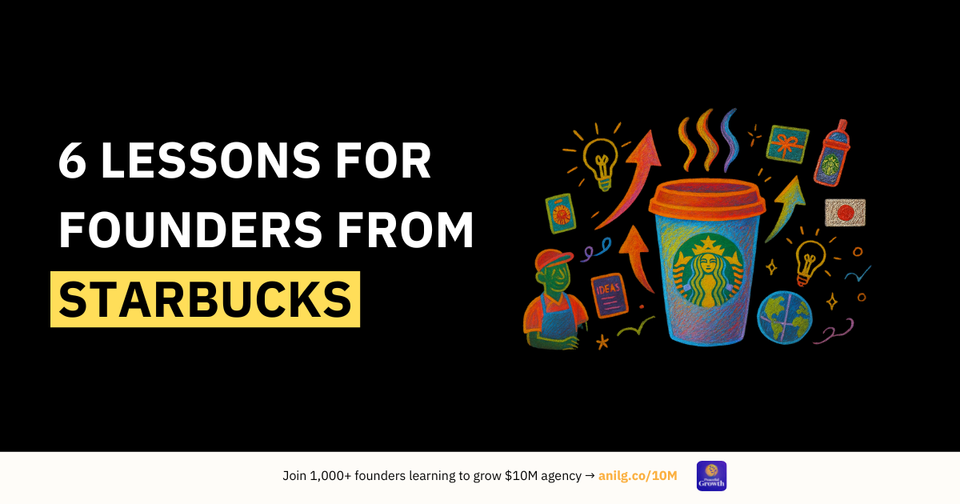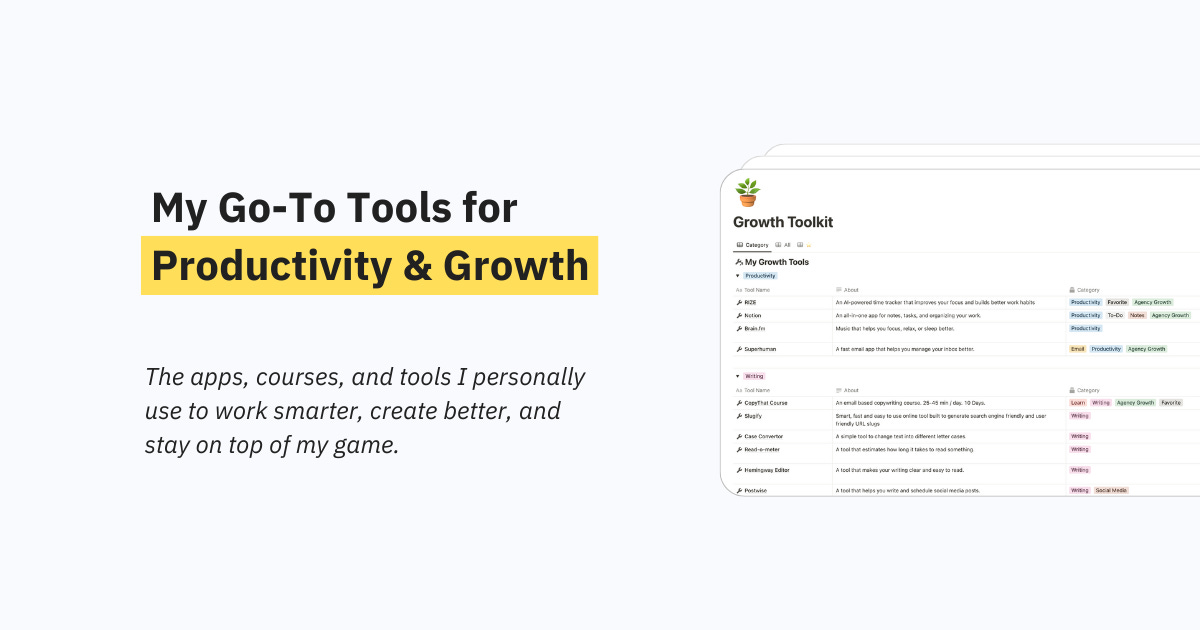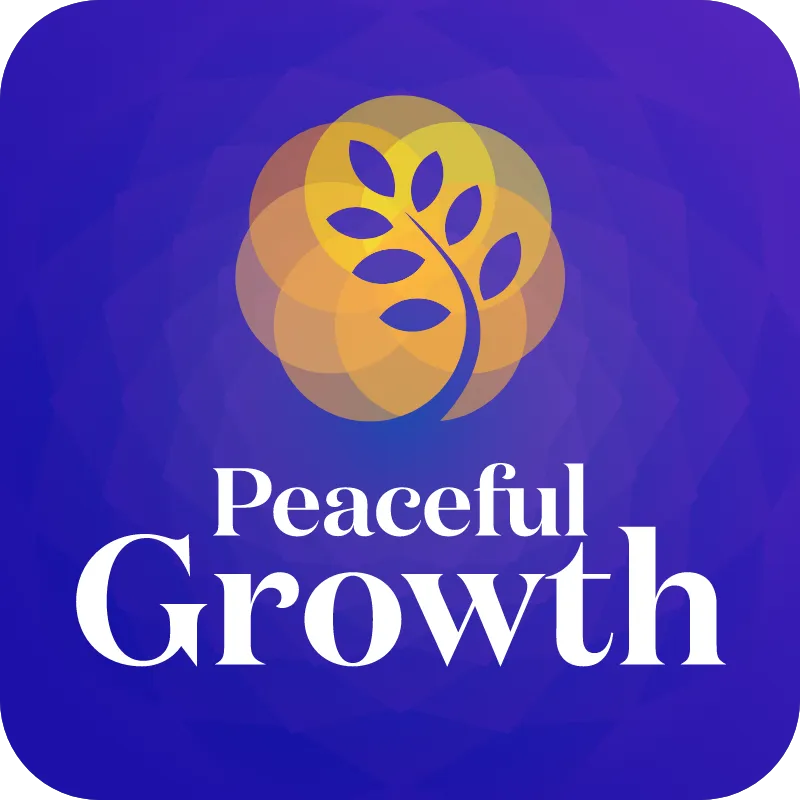6 Big Business Lessons I Learned from Starbucks (and a Coffee Cup)

Welcome to Peaceful Growth, where you will find actionable tips to grow your agency to $10M (without working overtime).
I’ve been obsessed with this 3-hour podcast I recently listened to featuring Howard Schultz, the CEO of Starbucks.
Two reasons: one, I love coffee. Two, Starbucks has been like my second home—my go-to co-working spot to read, write, and think. I’ve probably spent over $5,000 there in the last 10 years. No regrets! 😄
But what struck me the most wasn’t the coffee. It was Howard’s leadership. The way he built Starbucks into a global brand blew my mind. I didn’t know much about him before, but after this podcast, I was like—wow, this guy is a powerhouse of vision, grit, and heart.
Here are my 6 favorite business and leadership lessons from the Howard and Starbucks that I think every founder will enjoy.
1. The Power of a Simple Innovation: The Starbucks Cup
In the podcast, Howard talked about how the Starbucks cup became an unintentional marketing masterstroke. It started with a problem: the usual Styrofoam cups were messing with the taste of the coffee.
So he searched for a better cup. Eventually, he found one with a smooth white design. That, combined with the Starbucks logo, turned the cup into a walking billboard and badge of honor, sparking viral growth by tapping into customer emotions—status, pride, identity.
Lesson: The biggest lesson for me? Sometimes it’s not the product itself—it’s how you present it. The packaging. The emotion it evokes. Starbucks turned a simple coffee cup into a symbol of pride and status. That’s powerful. In a services business, it’s not as straightforward—but our clients are human too. What can we do to make them feel proud to partner with us? To carry our brand like a badge of honor?
2. Innovation Doesn’t Have to Be Top-Down: The Name on the Cup
Many of Starbucks’ most iconic ideas didn’t come from the top—they came from employees and customers.
Take the simple example of writing names on cups. Howard admitted in the podcast that this idea didn’t come from him. It was just a practical barista hack to handle busy lines—and it became part of the brand.
Or the Frappuccino. That came from a store manager in Santa Monica. Howard hated the idea at first. But customers loved it. Now it’s a multi-billion-dollar product.
Lesson: Big takeaway for me as a founder: Listen more. Many great ideas are already around us—shared by our team and our customers. Just pause and pay attention.
3. Trusting Your Instinct: Expanding to Japan
Howard’s decision to enter Japan is one of the most fascinating parts of the podcast.
Everyone told him not to. The board pushed back. A consultant handed him a 50-page report saying it wouldn’t work.
But Howard had a gut feeling. He followed it. He found the right partner and launched in Tokyo. The result? Massive success from day one.
Lesson: And this is something I’ve heard from many successful founders: you have to tap into your inner genius—your instinct or intuition. At Multidots, one of our core values is “Make Magic Happen.” It’s our way of encouraging everyone to trust their instincts, even when the data isn’t fully there. Of course, there’s a difference between a wild guess and a well-informed instinct. If I suddenly felt the urge to buy crypto without knowing anything about it—that’s not instinct, that’s impulse. But if I’ve spent years building businesses and I feel a strong pull toward a growth idea in that domain—that’s worth paying attention to.
4. Avoiding Arrogance: The Frappuccino and Coca-Cola
This part fired me up.
Howard initially hated the Frappuccino. He didn’t like the name or the drink. It wasn’t “coffee-forward” enough. But customers loved it—especially in Southern California. So Howard embraced it.
Then he pitched the idea of bottling it. Coca-Cola brushed him off. Wouldn’t even let him explain.
But Pepsi? Their CEO and President loved the idea. They shook hands on a napkin and launched a 50-50 joint venture. It became a multi-billion-dollar business.
Lesson: Don’t let arrogance blind you like it did Coca-Cola. No matter how big you get, lead like it’s always Day 1. That’s how you stay sharp—and win big.
5. Small Innovations, Big Impact: The Gift Card
This one blew my mind.
In the podcast, Howard shared how Starbucks gift cards and the mobile app created an "unbelievable business model."
At any time, Starbucks holds $1.7–$1.8 billion in unused gift card funds—essentially an interest-free loan from customers. Some of that money never gets spent. If Starbucks were a bank, it would rank in the top 10% of U.S. banks by deposits!
Lesson: I’m a big believer in uncovering atomic growth opportunities. It’s not always about launching a new product or entering a new market—sometimes, it’s a small, creative idea (like Starbucks' gift card) that unlocks explosive growth.
6. Leading in Winter Season: Saving Starbucks from Insolvency
In 2008, Starbucks was in crisis. The market cap had dropped from $30 billion to under $7 billion. Same-store sales were down for the first time. The company was seven months from insolvency.
Howard came back as interim CEO.
He shut 1,000 stores. Laid off people. Cried during an all-hands and apologized to the entire company. He was terrified Starbucks would be acquired. Starbucks was in Winter season of the business.
Then he gathered 10,000 store managers in New Orleans. They spent a day doing community service before he laid out the brutal truth: "We’ve got 7 months before we’re out of money."
He suggested a simple solution: 10 more customers per store per day. One cup at a time. One partner at a time.
The team got back to work. Profits jumped from $315 million to $945 million in two years.
Lesson: In the winter seasons of business, lead with radical honesty. Make the tough calls. Simplify the mission. And most importantly—trust your people to rise.
Final Thought
This podcast reminded me: great businesses aren’t built on one big idea. They’re built on small decisions, bold instincts, team-driven breakthroughs, and a willingness to course-correct.
Howard Schultz didn’t just build a coffee chain. He built a culture. A movement. A brand people are proud to carry in their hands.
And it all started with a cup.
—
Go listen to the full podcast. It’s packed with golden lessons.
And let me know—which of these 6 ideas hit you the hardest?
Did you enjoy this newsletter? Check out my other stuff too:
- Subscribe to Learn + Grow for tips on leadership, health, and productivity to keep you at your best
- Subscribe to WP for Enterprises to learn how billion-dollar brands use WordPress
- Listen to the Peaceful Growth Podcast for insights on how to grow your agency
- Hire Multidots to build or migrate your website to WordPress
- Try Google Docs-style collaboration in WordPress with Multicollab
- Check out the collection of premium WooCommerce Plugins
- Feel stuck? Try 1:1 founder-to-founder mentoring. Ask anything: sales, marketing, people, growth. Pay only if I help. Schedule a free 15-min intro.
Follow me on Twitter/X: @guptaanilg
Connect with me on LinkedIn: @guptaanilg
Someone forwarded this message? Subscribe here.
One More Thing...
A lot of you have asked about the tools I use to stay productive and grow my agency.
So, I put them all in one place—organized by category:
- Writing Tools ✍️
- Productivity Apps ⏳
- Skills and Courses for Founders 🎓
And more.
You can check them out here.
Hope it helps! 🚀


Member discussion